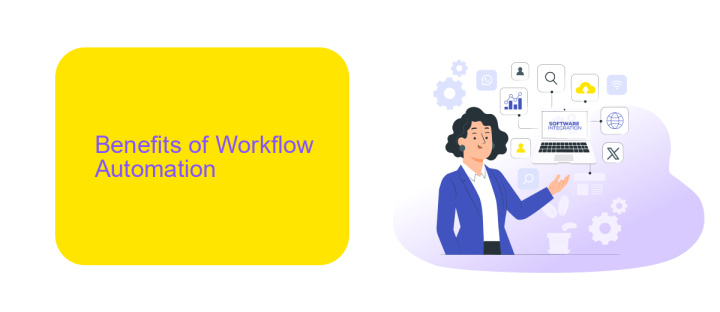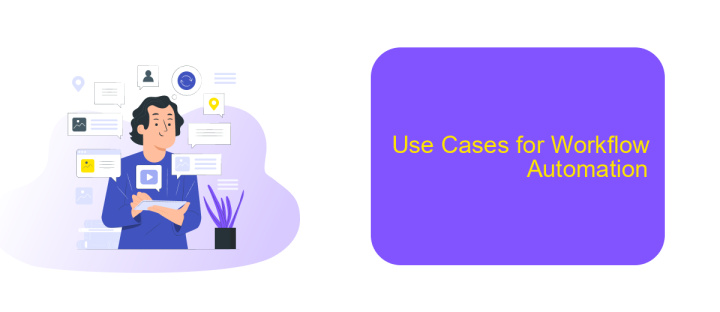Workflow Automation Use Cases
Workflow automation has revolutionized the way businesses operate, streamlining processes and enhancing efficiency across various sectors. By automating repetitive tasks, organizations can focus on higher-value activities, reduce human error, and improve overall productivity. This article explores key use cases of workflow automation, demonstrating its transformative impact on industries such as finance, healthcare, and customer service.
Introduction
Workflow automation has become a cornerstone for businesses aiming to enhance efficiency and productivity. By automating repetitive tasks, companies can focus more on strategic initiatives and less on mundane activities. This transformation is not just a trend but a necessity in today's fast-paced business environment.
- Streamlining communication across departments
- Automating data entry and management
- Enhancing customer service through automated responses
- Integrating various software applications for seamless operations
One of the key players in the field of workflow automation is ApiX-Drive, a service that specializes in setting up integrations between different platforms. With ApiX-Drive, businesses can effortlessly connect their CRM, email marketing tools, and other applications, ensuring smooth data flow and operational harmony. This not only reduces the risk of human error but also saves valuable time and resources.
Benefits of Workflow Automation

Workflow automation significantly enhances operational efficiency by streamlining repetitive tasks and reducing the need for manual intervention. This leads to faster completion times, fewer errors, and a more consistent output. By automating routine processes, employees can focus on higher-value tasks that require creativity and strategic thinking, ultimately boosting productivity and job satisfaction.
Moreover, workflow automation improves data accuracy and enhances decision-making capabilities. Automated systems can seamlessly integrate with various tools and platforms, such as ApiX-Drive, to synchronize data across different applications. This ensures that all stakeholders have access to real-time information, facilitating better collaboration and more informed decisions. Additionally, automation can lead to cost savings by reducing labor costs and minimizing the risk of costly errors.
Types of Workflow Automation

Workflow automation can significantly enhance productivity and efficiency in various business processes. There are several types of workflow automation that organizations can implement to streamline their operations.
- Task Automation: This involves automating repetitive tasks such as data entry, email responses, and scheduling. Tools like ApiX-Drive can help integrate different applications and automate these routine tasks seamlessly.
- Process Automation: This type of automation focuses on automating entire business processes such as order processing, invoicing, and customer support. By using workflow management systems, companies can ensure that these processes are executed consistently and efficiently.
- Approval Automation: Automating approval workflows can speed up decision-making processes. For instance, document approvals, budget approvals, and leave requests can be automated to reduce delays and enhance accountability.
Implementing these types of workflow automation can lead to significant time savings and increased operational efficiency. By leveraging tools like ApiX-Drive, businesses can easily integrate and automate various applications, making their workflows more streamlined and effective.
Use Cases for Workflow Automation

Workflow automation is revolutionizing how businesses operate by streamlining repetitive tasks and improving efficiency. This technology can be applied across various industries to enhance productivity and reduce human error.
One of the primary use cases for workflow automation is in customer relationship management (CRM). Automating CRM processes allows businesses to manage customer interactions and data more effectively. Another significant area is human resources, where automation can handle tasks such as employee onboarding, leave requests, and performance reviews.
- Customer Relationship Management (CRM): Automate data entry, follow-up emails, and customer segmentation.
- Human Resources: Streamline onboarding, leave management, and performance evaluations.
- Marketing: Automate email campaigns, social media posts, and lead nurturing.
- Finance: Manage invoicing, expense tracking, and financial reporting.
- IT Services: Automate ticketing systems, software updates, and system monitoring.
Integrating different applications and services is crucial for effective workflow automation. Tools like ApiX-Drive facilitate seamless integration between various software, allowing businesses to automate complex workflows without extensive coding. By leveraging such tools, companies can ensure that their automated processes are both efficient and reliable.
Best Practices for Implementing Workflow Automation
When implementing workflow automation, it is crucial to start by clearly defining your processes and goals. Map out each step of your workflow to identify areas that can benefit from automation. This helps in setting clear expectations and ensures that the automation aligns with your business objectives. Additionally, involve key stakeholders from the beginning to gain insights and foster a sense of ownership, which can be crucial for successful implementation.
Choosing the right tools is another essential aspect. Opt for reliable and scalable automation solutions that can integrate seamlessly with your existing systems. For instance, ApiX-Drive is a versatile service that allows for easy integration of various applications, streamlining your workflow. Regularly monitor and review the automated processes to make necessary adjustments and improvements. Training your team to effectively use these tools is also vital for maximizing the benefits of workflow automation.
- Automate the work of an online store or landing
- Empower through integration
- Don't spend money on programmers and integrators
- Save time by automating routine tasks
FAQ
What is workflow automation?
How can workflow automation benefit my business?
What are some common use cases for workflow automation?
How difficult is it to implement workflow automation?
What tools can help me get started with workflow automation?
Apix-Drive will help optimize business processes, save you from a lot of routine tasks and unnecessary costs for automation, attracting additional specialists. Try setting up a free test connection with ApiX-Drive and see for yourself. Now you have to think about where to invest the freed time and money!


